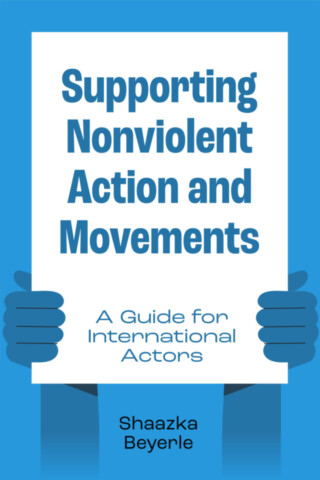Supporting Nonviolent Action and Movements
Determining whether and how to support grassroots actors can seem daunting. Nonviolent social movements, campaigns, and civic initiatives are, by their nature, bottom-up, homegrown phenomena involving the voluntary participation of citizens. These social movements are often fluid and decentralized, composed of multiple formal and informal entities arrayed in networks or coalitions. Is it possible to enable or support what are essentially organic groupings and processes? Based upon detailed research and extensive interviews, Shaazka Beyerle examines how external actors can support anti-corruption, transparency, accountability, and good governance movements and campaigns, and provides invaluable strategic questions, considerations, and practices to better inform donor policy decisions and practices to support peaceful citizen-driven change, particularly in fragile contexts.
Introduction
Toward a Movement Mindset
Definitions
Abbreviations
1. Why Support Nonviolent Action?
2. Identifying Nonviolent Action Catalysts
3. Constructive Engagement with Grassroots Actors
4. Timing Support with Movement Phases
5. Pathways for Support
6. Monitoring, Evaluation, and Learning
Conclusion
Appendix
Notes
Shaazka Beyerle
Shaazka Beyerle is a senior fellow with the Terrorism, Transnational Crime, and Corruption Center at George Mason University. She is a researcher, writer, and educator in nonviolent action, focusing on anti-corruption, accountability, peacebuilding, gender, and human rights. She was previously a senior research scholar and Jennings Randolph Senior Fellow with the Program on Nonviolent Action at the United States Institute of Peace and an elected Coordination Committee member of the UN Convention against Corruption Civil Society Coalition. She is the author of Curtailing Corruption: People Power for Accountability and Justice (Lynne Rienner Publishers, 2014) and, most recently, coauthor of a chapter on enabling civil society and social movements in Untapped Power: Leveraging Diversity and Inclusion for Conflict and Development (Oxford University Press, 2022). Ms. Beyerle has taught at George Mason University, Georgetown University, and the University for Peace, Costa Rica.

